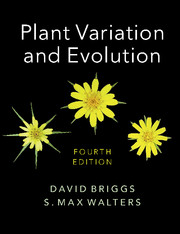Book contents
- Frontmatter
- Contents
- Preface to the Fourth Edition
- Acknowledgements
- Note on names of plants
- List of abbreviations
- 1 Investigating plant variation and evolution
- 2 From Ray to Darwin
- 3 Early work on biometry
- 4 Early work on the basis of individual variation
- 5 Post-Darwinian ideas about evolution
- 6 DNA: towards an understanding of heredity and molecular evolution
- 7 Breeding systems
- 8 Intraspecific variation and the ecotype concept
- 9 Pattern and process in plant populations
- 10 Pattern and process: factors interacting with natural selection
- 11 Populations: origins and extinctions
- 12 Species and speciation: concepts and models
- 13 Allopatric speciation and hybridisation
- 14 Abrupt speciation
- 15 The species concept
- 16 Flowering plant evolution: advances, challenges and prospects
- 17 Historical biogeography
- 18 The evolutionary impact of human activities
- 19 The taxonomic challenge ahead
- 20 Conservation: from protection to restoration and beyond
- Glossary
- References
- Index
19 - The taxonomic challenge ahead
Published online by Cambridge University Press: 05 June 2016
- Frontmatter
- Contents
- Preface to the Fourth Edition
- Acknowledgements
- Note on names of plants
- List of abbreviations
- 1 Investigating plant variation and evolution
- 2 From Ray to Darwin
- 3 Early work on biometry
- 4 Early work on the basis of individual variation
- 5 Post-Darwinian ideas about evolution
- 6 DNA: towards an understanding of heredity and molecular evolution
- 7 Breeding systems
- 8 Intraspecific variation and the ecotype concept
- 9 Pattern and process in plant populations
- 10 Pattern and process: factors interacting with natural selection
- 11 Populations: origins and extinctions
- 12 Species and speciation: concepts and models
- 13 Allopatric speciation and hybridisation
- 14 Abrupt speciation
- 15 The species concept
- 16 Flowering plant evolution: advances, challenges and prospects
- 17 Historical biogeography
- 18 The evolutionary impact of human activities
- 19 The taxonomic challenge ahead
- 20 Conservation: from protection to restoration and beyond
- Glossary
- References
- Index
Summary
We live in a species-rich world that is increasingly under human influence. As we have seen in earlier chapters, there is abundant evidence that many species are endangered, and this includes unknown organisms that have yet to be named and classified. If we are to appreciate the true extent of biodiversity, there is a formidable and urgent taxonomic task ahead (Mallet & Willmott, 2003; Bateman, 2011).
What are the prospects of the completion of a catalogue of life?
The challenges are discussed by Wheeler (2008), who comes to the conclusion that, at the very point in history where a major effort is required of taxonomists, there is a growing concern that taxonomy has suffered a ‘decline in prestige and support’.
As we have seen in earlier chapters, taxonomy has a very long history. Wheeler considers that two twentieth-century developments, in particular, have challenged the status, funding and prospects of taxonomic studies. We have seen in earlier chapters that, in the 1920s and 1930s, biologists became increasingly interested in experimental and genetic investigations of evolutionary patterns and processes. Many botanists, initially trained as taxonomists, turned to these investigatory studies to study intraspecific variation, speciation etc. These approaches became known as Experimental Taxonomy or Biosystematics. Huxley (1940) in his classic book New Systematics hoped for the rise of an integrated subject, but Wheeler points out that some biologists, enthusiastic for the emerging specialisms, came to believe that taxonomy, being ‘non-experimental’, was not really a science, but was involved with ‘subjectively naming and classifying species’. Thus, ‘taxonomy involved arbitrary bookkeeping and pigeonholing practices and legalistic wrangling over scientific names, while systematics was experimental and intellectually exciting and expansive’. In parenthesis, we may note that this perception of taxonomy, as ‘merely descriptive’ and ‘non-analytical’, has been very strongly challenged. For example, Lipscombe, Platnick & Wheeler (2003) and Sluys (2013) argue very effectively that taxonomic study is ‘hypothesis driven’.
Returning to Wheeler's analysis, he points to an even bigger revolution later in the century, when molecular and computational techniques were introduced to energise an already vigorous experimental tradition, providing the tools for major advances in all aspects of micro- and macro-evolution, and the emergence of molecular phylogenetics and modern biogeography.
- Type
- Chapter
- Information
- Plant Variation and Evolution , pp. 439 - 448Publisher: Cambridge University PressPrint publication year: 2016



